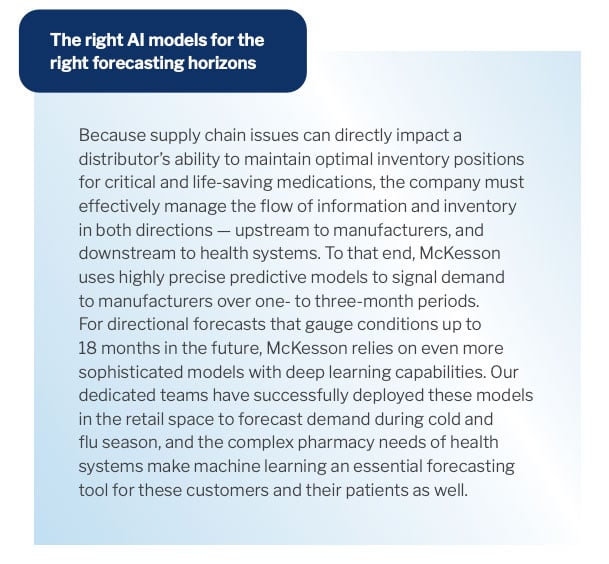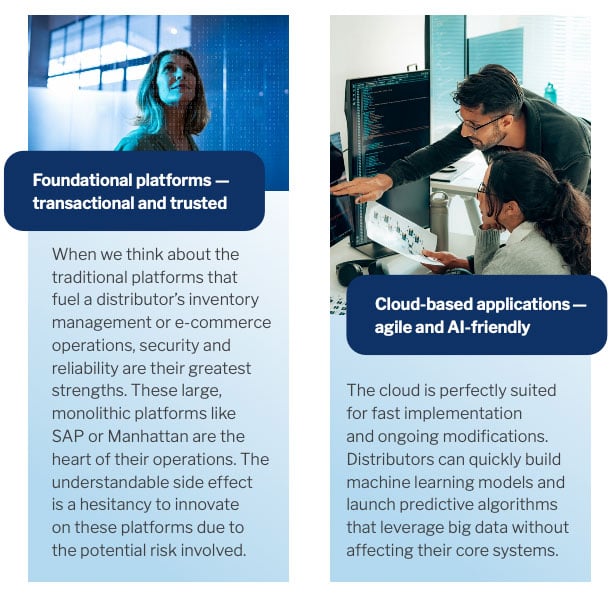Read time: 4 minutes
By: Katya Hall
Drug shortages are an industrywide problem costing U.S. hospitals almost $360 million in labor expenses each year. They also add an estimated $230 million more a year to drug costs in the U.S. as providers switch to expensive alternative drugs when preferred generic substitutions are unavailable. No matter what seasonal illnesses, manufacturing issues, or supply chain disruptions may be on the horizon, health system leaders need to know they can count on their distributor to accurately forecast drug shortages — and to take action as early as possible to mitigate interruptions.
McKesson is leaning into supply shortage management by developing advanced AI models to fortify traditional insights and analytics. These models leverage our tremendous breadth of supplier and customer data to make more accurate projections, increase transparency, and deliver agile inventory solutions. Additionally, we’re now investing into third party data that’s predictive of supply disruptions in order to make our forecasts and insights even more powerful, give us greater lead time, and continue to make us a leader in how we manage product availability.

Two tech worlds: blending traditional platforms with emerging innovations
Perhaps the greatest challenge for distributors in embracing AI is to bring two very different worlds of technology together — traditional enterprise-scale platforms and innovation-friendly cloud infrastructures — in a complementary way. As outlined below, each one has its strengths, and both are critical to a robust supply chain strategy based on data-driven decision-making.

Together, these platforms can help distributors balance the need for operational continuity with the desire to take full advantage of emerging technologies to enhance forecasting models and support a rapid, relevant response. Ultimately, however, the mission-critical platforms comprising a distributor’s core operations must integrate seamlessly with AI initiatives. That’s why McKesson is beginning to transition some of these on-premises systems to cloud-based platforms as well.
Cloud infrastructures are more flexible and scalable than traditional systems, and they are able to process more data more quickly.
By gradually moving the enterprise toward more cloud-based systems, McKesson continues to fine-tune its ability to:
Forecast demand with accuracy
As one of the nation’s largest wholesalers of pharmaceuticals and medical supplies, McKesson has access to a wealth of data to help paint an accurate picture of demand in the weeks and months ahead. McKesson’s patented inventory management methods and proprietary machine learning algorithms help detect patient dispense demand patterns, seasonal spikes, and supply volatility. This equips McKesson to forecast demand fluctuations in advance of customers’ needs, identify at-risk items, communicate clearly with suppliers and customers, and take action to meet the demand.
Proactively manage pharmaceutical inventory
These predictive machine learning tools support proactive decision-making by giving McKesson critical visibility into emerging drug shortages or supply chain disruptions. In turn, McKesson can make swift, well-informed purchases of any drugs expected to be in short supply, along with alternative medications that quickly join the shortage list when the primary drug becomes unavailable.
Secure and sequester critical items
With McKesson’s proprietary Compass program, critical items are purchased and sequestered in one or more of the company’s 30 distribution centers, keeping these items accessible to health systems while reducing the burden of on-site storage at hospitals, clinics, infusion centers, and other sites of care.
Hold manufacturers accountable
Advanced analytics and machine learning have driven significant improvement in McKesson’s ability to not only communicate supply issues upstream to manufacturers, but also to hold them accountable for how they respond. When there’s a predicted shortage, manufacturers can choose to opt in to deliver at a higher level, or to override that level of demand. In McKesson’s experience, timely and thorough communication of demand upstream helps manufacturers adjust and deliver to meet inventory goals.
Cultivate partnerships to expand sourcing options
McKesson’s proprietary ClarusONE and NorthStar private label solutions offer health systems customized sourcing at competitive pricing for things like injectables. Through McKesson partnerships, we have the supplier qualifications, insights, and scale to bring new players to the market and build scale.
Bring enhanced visibility to last-mile tracking
McKesson’s partnership with FedEx and UPS leverages a cloud-based platform that acts as a one-stop, real-time view of critical distribution data within the McKesson customer portal for enhanced visibility of shipment status. This data will drive predictive analytics and process improvements to further enhance the customer experience.
“Anytime we can signal demand with more notice, it allows manufacturers to increase their manufacturing capacity and increase their output. It’s the tide that lifts all boats.” — Katya Hall, Senior Director, Systems
McKesson’s cloud-based data aggregation, machine learning, and predictive analytics — coupled with proprietary algorithms that simulate network response — are fueling end-to-end transparency, communication, and supply chain enhancement. As a result, health systems can count on McKesson for more consistent product availability, even amid manufacturing issues, global recalls, discontinued products, regional disasters, and public health emergencies.
To learn more about McKesson’s investments in AI to help your health system achieve more, download the full eBook, Achieving More for Health Systems with Investments in AI, by filling out the form below.
While AI supports our services, and while we strive for accuracy, outcomes may vary, and AI may occasionally make mistakes. We are committed to using AI responsibly, focusing on transparency, privacy, security, fairness, and continuous improvements to enhance reliability and accuracy.

Share
Post
Post
Email